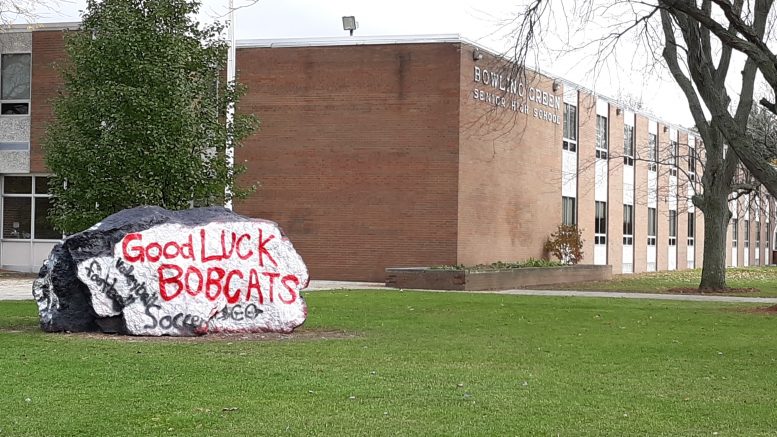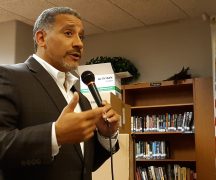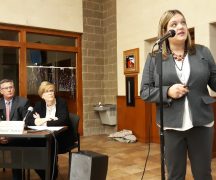BY JAN McLAUGHLIN
BG Independent News
Facing deficit spending after 14 years of not asking voters for more operating funds, the Bowling Green Board of Education voted 4-1 Thursday to put an income tax on the November ballot.
The four members voting in favor of trying the ballot issue were Tracy Hovest, Norm Geer, Ardy Gonyer and Ryan Myers. They all cited the need to prevent the district from going into the red and to stave off cuts to services for students.
The lone “no” vote came from Peggy Thompson, who said the district should not ask taxpayers for more money at a time when everything is costing more.
The resolution passed by the board asks the Ohio Department of Taxation to calculate how much a 0.75% income tax will generate. In July, the board will vote on a resolution to put the ballot on the general election ballot in November.
Income taxes collected for school districts can only be implemented in quarter percentages. So the district’s options to raise more operating funds are income taxes at 0.25%, 0.5%, 0.75% or 1%.
Incoming district treasurer Matt Feasel explained the forecasted financial effects of each of the different tax rates. He also pointed out that Bowling Green City Schools current income tax is 0.5% – one of the lowest in the state.
According to Feasel, because of the delayed collection of income taxes by the state, putting a 0.25% income tax on the ballot will not give the district enough revenue to prevent deficit spending. A 0.5% income tax will still do too little to buoy the budget. A 1% income tax would be nice, but unlikely to garner voter support.
“You have to look at what’s responsible to the voters in the district,” Feasel said.
But the 0.75% income tax would lift the district away from deficit spending, while allowing the district to keep its programming and current staffing levels.
“Based on today’s numbers, that’s where we’re at,” Feasel said. “If you want to maintain your current programs.”
Feasel cautioned that income tax revenue does not reach its maximum until three years after the levy is passed – so it’s not a quick fix.
Board President Tracy Hovest noted that the board has been working on financial stability for years.
“This has been the plan. We’re not springing this on anybody,” Hovest said. “We’ve been talking about it for the past four years.”
Superintendent Ted Haselman and Feasel agreed.
It was “no secret” the district was going to need more revenue for operations, Feasel said.
Haselman said he was aware before he took the superintendent job with the district that a new levy would be needed.
“I think it’s impressive we went 14 years” with no new operating money, he said. “That’s a long time.”
“The district has been on a fixed income for 14 years,” while district expenses continued to rise, Haselman said.
“I think it’s pretty clear we need to do something,” board member Ardy Gonyer said. “Our programs are fantastic here. We’re making it a destination district.”
The hope is that the district will regain some of its enrollment as people see the changes with new leadership and a new high school on the way. But the district can’t wait until the enrollment grows to ask for operating funds, Gonyer said.
Board member Norm Geer said a request for income tax provides a balance with the property tax already in place. And as incomes go up, so will the district’s revenue.
Geer suggested that the income tax levy be for a continuing period.
The district has been frugal, he said, but “it’s going to cost money to do things right.”
Board member Ryan Myers also voiced support for the 0.75% income tax levy.
“We are one of the lowest in the state,” he said of the district’s current income tax rate. “I think we’ve been very good stewards of taxpayers’ money.”
And the time to act is now, Myers said.
“Clearly with these numbers, we need to address this,” he said.
Prior to the board’s discussion of the levy request, citizen Steve Bateson voiced concern that since COVID, the district’s enrollment has dropped by 332 students.
“That’s a significant amount of state funding we lost,” Bateson said.
But while student numbers dipped, staffing numbers remained the same, he said.
“If you’re going to try to pass something, you’ve got to show all the facts,” Bateson said to the board.
The district offers a broader curriculum than many area school districts, but that’s not enough, he said.
“What are we going to do to get those students back?” Bateson asked.
Feasel acknowledged the loss of students. And the loss of funding from vouchers paying for non-public education.
“Steve’s right, there are a lot of things we can look at,” Feasel said. “Ultimately, our goal is to bring the students back.”
The board also discussed whether the income tax issue should be for five years or a continuing period.
“We’ll be back in the same boat, asking for more in five or six years,” if it’s not a continuing levy, Hovest said.
Feasel agreed.
“Continuing is the way to go,” he said. “To be constantly on the ballot in schools is difficult.”
But Thompson said the district should wait to ask the voters for more money. Instead, she suggested the district look for “some waste” to trim to keep the district in the black.
“They are tired of everybody asking for more money,” Thompson said of local residents.
Hovest pointed out that waiting till next year to seek funding will require one of two actions – neither good – of making cuts and asking voters for even more money.
Thompson also echoed Bateson’s concerns about staffing numbers.
“If we are servicing 300 less students, I would have thought we would need less staff,” Thompson said.
But Hovest said schools are seeing needs among students that weren’t there before COVID. BG schools now have nurses in every school building, and more staff providing help with mental health needs.
Hovest acknowledged that 80-90% of operations funds pay for personnel.
“I won’t apologize for that,” she said of investing in good staff. “I don’t want to go backwards and I don’t want to cut services.”
“Just to get by is not good enough,” Hovest said.





